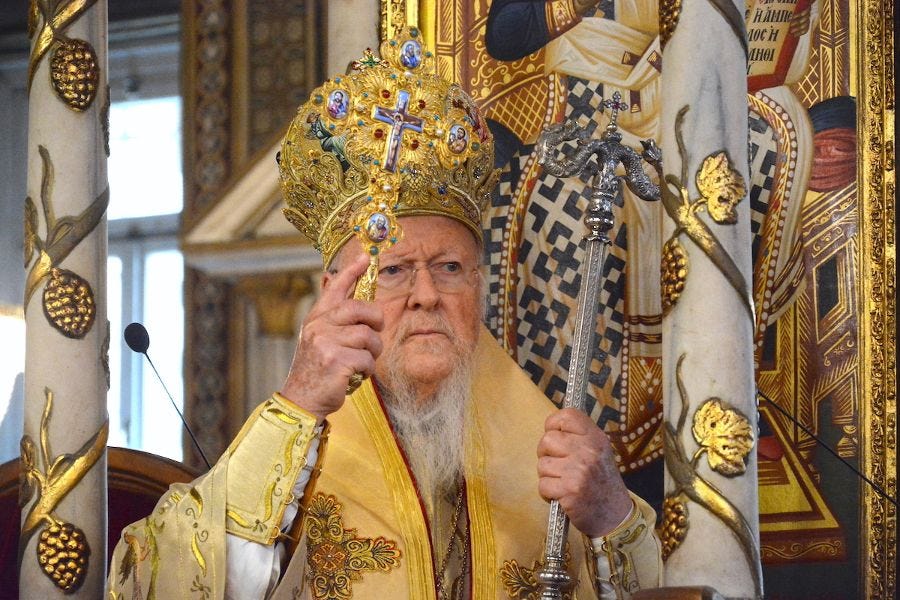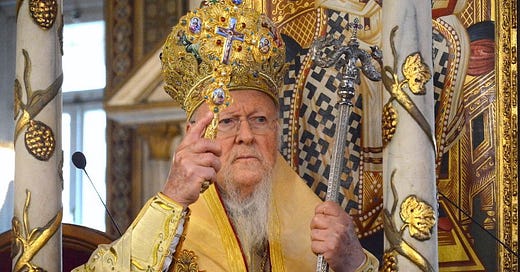
Ecumenical Patriarch: Better for Patriarch Kirill to step down than back war
In an interview with The Pillar, Ecumenical Patriarch Bartholomew lamented Patriarch Kirill of Moscow’s stance on the Ukraine war.

The Ecumenical Patriarch of Constantinople has said that it would be better for the head of the Russian Orthodox Church to step down than offer support for the “cruel invasion” of Ukraine.
In an interview with The Pillar ahead of a visit to Britain on Friday, Ecumenical Patriarch Bartholomew lamented Patriarch Kirill of Moscow’s stance on Russia’s full-scale invasion of its neighbor.
The spiritual leader of an estimated 300 million Orthodox Christians worldwide indicated that the ongoing war between largely Eastern Orthodox combatants had “weighed heavily” on him.
“What is still more painful to us is the fact that the Patriarchate of Moscow has stooped to the level of submitting to political ambitions of the Russian Federation, even endorsing and seemingly blessing this cruel invasion and unjustifiable bloodshed,” he told The Pillar.
“We have repeatedly condemned the aggression and violence, just as we have fervently and fraternally appealed to the Patriarch of Moscow that he separate himself from political crimes, even if it means stepping down from his throne.”
The Ecumenical Patriarch, the leader of the world’s second-largest Christian communion, denounced the full-scale Russian invasion after it began on Feb. 24 and visited Ukrainian refugees in Poland in March.
He has previously called for Patriarch Kirill to resign in protest at Russian President Vladimir Putin’s decision to intensify the war in Ukraine, which dates back to 2014.
In a May interview, the Ecumenical Patriarch said that, despite recent differences between Moscow and Constantinople, he “would have still expected our brother, His Beatitude [Patriarch] Kirill, during this crucial and historical moment, to rise to the occasion, to sacrifice his throne, if necessary, and to tell Putin, ‘Mr. President, I cannot agree with you; I resign, I’m leaving.’”
Bartholomew emphasized to The Pillar that since that call, he continued to hope that the difficulties between Moscow and Constantinople would be resolved.
He referred to Moscow’s decision to sever ties with the Ecumenical Patriarchate after he issued a decree in 2019 recognizing the Orthodox Church of Ukraine’s independence.
He stressed it was unthinkable for the Ecumenical Patriarchate to respond in kind, “because it is unimaginable for the Mother Church of Constantinople to cut off its historical spiritual ties with the pious Russian people.”
“In this spirit,” he said, “we hope that someday the Moscow Patriarchate will also recognize that unity is not enforced by domination, but only embraced in freedom.”
Catholic-Orthodox unity
Bartholomew also told The Pillar he shared Pope Francis’ hope that Catholics and Orthodox Christians would one day achieve full communion.
“Unless we share hope and yearning for full communion, then we cannot really say that we are disciples of Christ,” he said.
“Union and communion is a mandate of the Lord Himself, who — on the night he was betrayed — prayed with tears that his disciples may be one (John 17:21).”
“Dialogue and reconciliation are not optional for us; they are directives and commandments. Needless to say, there remain obstacles, both ecclesiastical and theological.”
Visit to Britain
The Ecumenical Patriarch is due to visit the U.K. on Oct. 21-24 to mark the centenary of the Greek Orthodox Archdiocese of Thyateira and Great Britain.
Bartholomew said that following the 30th anniversary of his election in 2021, he had decided to visit the largest English-speaking dioceses of the Ecumenical Patriarchate of Constantinople in order of seniority. He began with a trip to the United States in the fall of 2021 and plans to visit Australia in 2024.
He noted that the Archdiocese of Thyateira and Great Britain was responsible for relations with the Archbishop of Canterbury, the spiritual leader of the Anglican Communion, and the Royal Family.
He said that the archdiocese had worked with the late Prince Philip, who had Greek Orthodox roots, and hoped to cooperate with the new King Charles III on environmental matters.
He also paid tribute to the renowned English theologian Metropolitan Kallistos Ware, who died in August.
He said that the author of notable books such as “The Orthodox Church” represented “the very best of what the Orthodox Church has to offer the contemporary world.”




